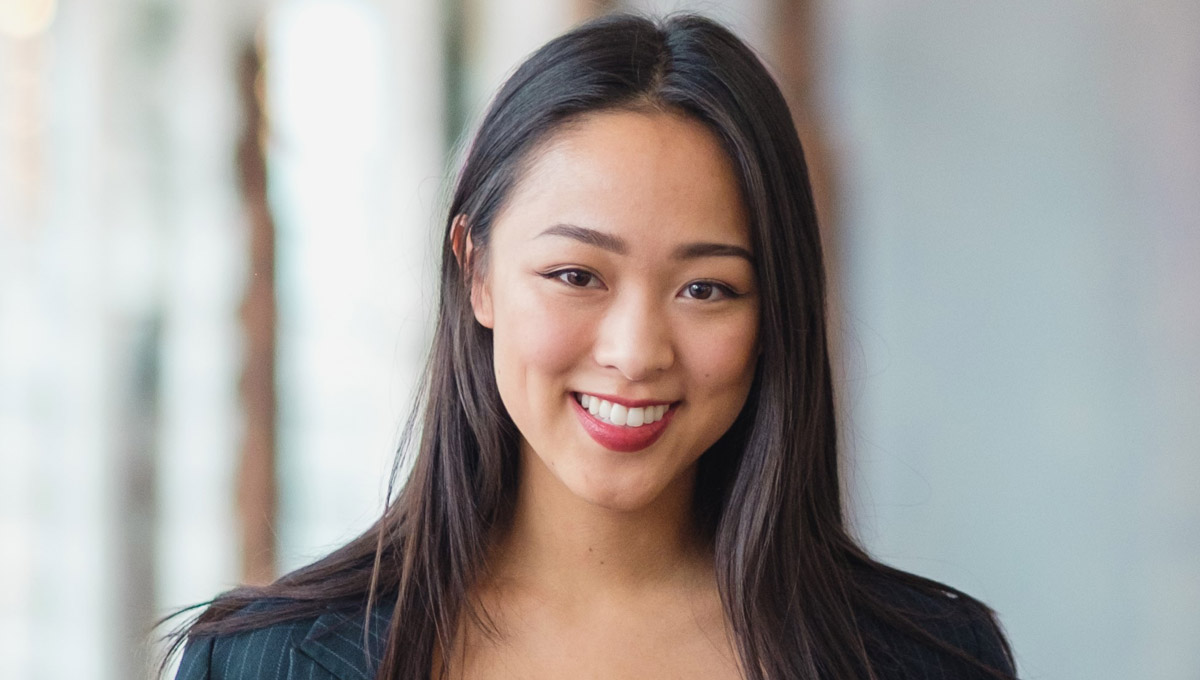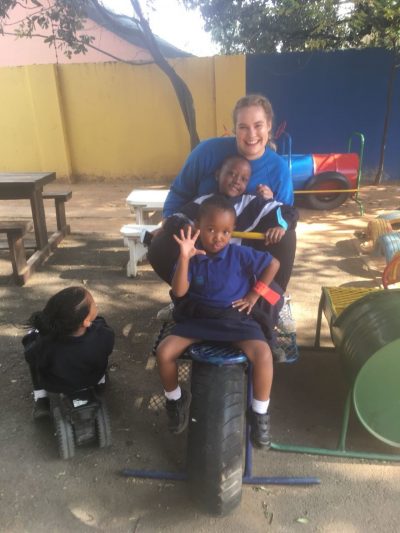The first group of students in the Bachelor of Global and International Studies (BGInS) are graduating from the joint program overseen by the Faculty of Arts and Social Sciences and Faculty of Public Affairs.
The 80 graduates began when the program was first offered in 2015. Student Irene Wang describes the end as bittersweet.
“BGInS exceeded my expectations. Despite being one of the first students undertaking this degree, I felt supported by faculty and staff, and am thankful for the professional and student leadership opportunities I have had access to,” says Wang, who specialized in Global Politics and took a minor in Economics.
“This program is not only special because of its unique structure, but because of its inclusive environment that is consistently reinforced with each new cohort,” she says.

Irene Wang
“BGInS students form a community of caring and supportive leaders who are active in the student community. I am excited to see how people use this degree to effect positive change around the world.”
Wang visited Japan in her final year for her international experience requirement.
“This cultural exchange program funded by the Ministry of Foreign Affairs of Japan allowed me to apply concepts I had only learned about in classrooms,” says Wang. “I was challenged to practice my cross-cultural skills, connected with a variety of Japanese officials and locals, and enjoyed amazing food.”
Another highlight was completing a research internship with a BGInS professor after her first year.
“I was thrilled to be conducting legal constitutional research to inform a decision by the African Union and a regional study on the implications of the Brexit decision. This was my first taste of the exciting and meaningful work for which this degree was preparing us,” says Wang.
The Importance of Mentorship
This fall, Wang is headed to the London School of Economics to pursue a master’s in International Political Economy.
“My experience in BGInS sparked my ambition to apply and prepared me with the necessary skills to do so. The interdisciplinary course structure gave me the diverse academic training and flexibility to explore the subject matter that interested me (and) led me to discover the discipline that I will be studying,” says Wang.
“I benefited immensely from the support of BGInS faculty (who) have a variety of career experiences and are highly approachable. I gained some important mentors who understood the field, cared about my success and gave me valuable guidance. I look forward to my next challenge with newfound excitement and confidence.”
Bethany Goral discovered the BGInS program after a Carleton representative visited her high school in Thunder Bay, Ont.

Bethany Goral with school children during her exchange.
“The specialization I chose, Global Development, was what solidified my decision to choose the BGInS program as it offered everything I wanted to achieve in my undergraduate degree with a combination of anthropology, economics and political science courses focused on exploring many different aspects of international development,” explains Goral.
“I had the opportunity to come to Carleton before making my final decision and met with the (first) director and creator of the program, Prof. Chris Brown, which also helped greatly in my decision to choose BGInS.”
With a minor in African Studies, Goral is excited to be graduating.
“I have been looking forward to this! We all have been through some tough core courses in the program and going through it as sort of the guinea pigs has really made us come together,” says Goral. “I think we all feel pretty proud.”
Goral’s next move is to pursue a master’s of Philanthropy and Nonprofit Leadership (MPNL) at Carleton’s School of Public Policy and Administration.
“The MPNL program is so innovative and interesting and I knew right away it would be perfect to combine my knowledge of international development with non-profit work,” says Goral. “I have already spent four years at Carleton and all throughout my time have had amazing and encouraging professors and received so much support from different Carleton services, as well as working for the Centre for Student Academic Support.
“I have come to know Carleton as a second home, so my decision to continue my studies as a graduate student at Carleton was easy!”
International Experiences Key to Student Success
Goral’s outstanding achievements in BGInS landed her the Donald K. Johnson Award in Philanthropy from the dean of Graduate and Postdoctoral Affairs.
“I am extremely grateful for being chosen to receive this award and it definitely encourages and helps my future studies in the MPNL program,” says Goral.
To complete the international experience requirement, Goral spent three months in South Africa at a non-profit academy for children, where she developed an interest in exploring educational development and ways to provide education for every child.
“I really want to pursue that in my future career, so definitely working with an NGO or non-profit that has a mission similar to that is in my future,” says Goral. “After getting my master’s, I’m hoping to get into the project management of non-profits to identify sustainable ways to execute projects and campaigns. I definitely want to travel with whatever I am doing too!”
Carleton’s BGInS degree was created after faculty and staff noted that they were regularly fielding questions at university fairs as to whether Carleton had an international studies program, says Program Director Neil Gerlach.
“Carleton has had a global politics program for a number of years, but a more holistic international studies program was missing,” says Gerlach. “We realized that Carleton has a large, previously untapped, expertise in that area at the undergraduate level. A committee was formed to explore the nature of that expertise and how it could be molded into a uniquely Carleton version of international studies.”
With approximately 30 international studies programs across the country, Carleton entered a competitive field. However, Gerlach says the program’s success has come from students’ ability to focus on traditional aspects of international studies, such as global politics and development, or choosing to focus on cultural aspects of globalization, such as global literatures, religions and environment. There are 18 specializations from which to choose, involving 20 different academic units on campus.

Bethany Goral
“Our program seeks to combine political and economic approaches with cultural and social approaches to produce well-rounded students who have a deeper understanding of global society and a more nuanced global mindset,” says Gerlach.
All students are required to have an international experience which is another unique element of the program says Gerlach. “The BGInS program has staff in place to administer this requirement and Carleton has been quite good at providing student funding to help alleviate the costs of international travel and work.”
Initially anticipating up to 75 students each year, Gerlach said the demand for the program exceeded more than 200 new students annually. The demand jumpstarted efforts to find enough international programs for students.
“Carleton did not have very much experience sending students abroad and BGInS personnel had to invent everything from scratch,” says Gerlach. “The first program director, Chris Brown and the international experience manager, Orlaith McCaul, had to establish contact with potential employers overseas, develop memoranda of understanding with these organizations and figure out what students needed to know before going overseas.”
Now there is a team that organizes and manages the students’ international experiences, consisting of staff from the Career Services office, International Student Services Office and the Student Experience Office.
By Ellen Tsaprailis